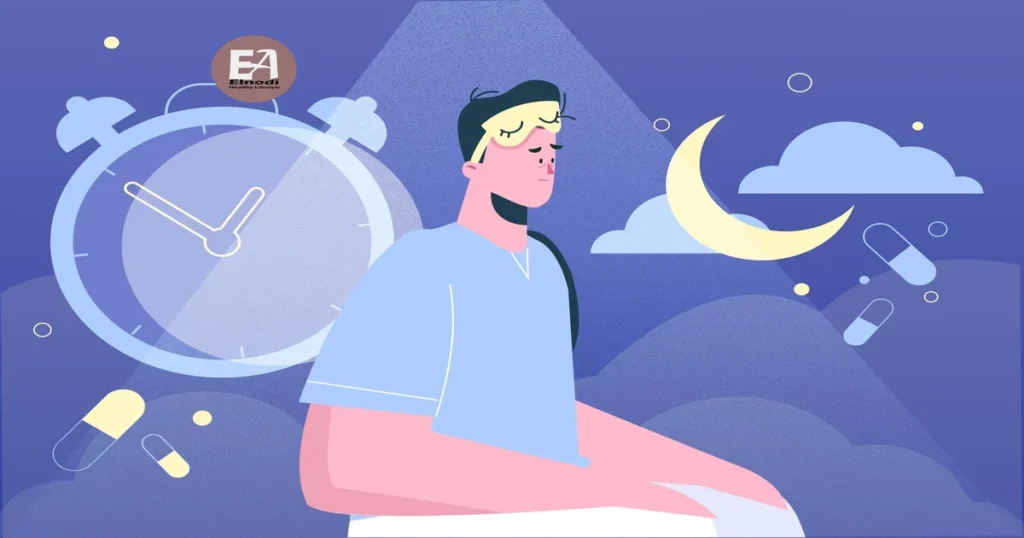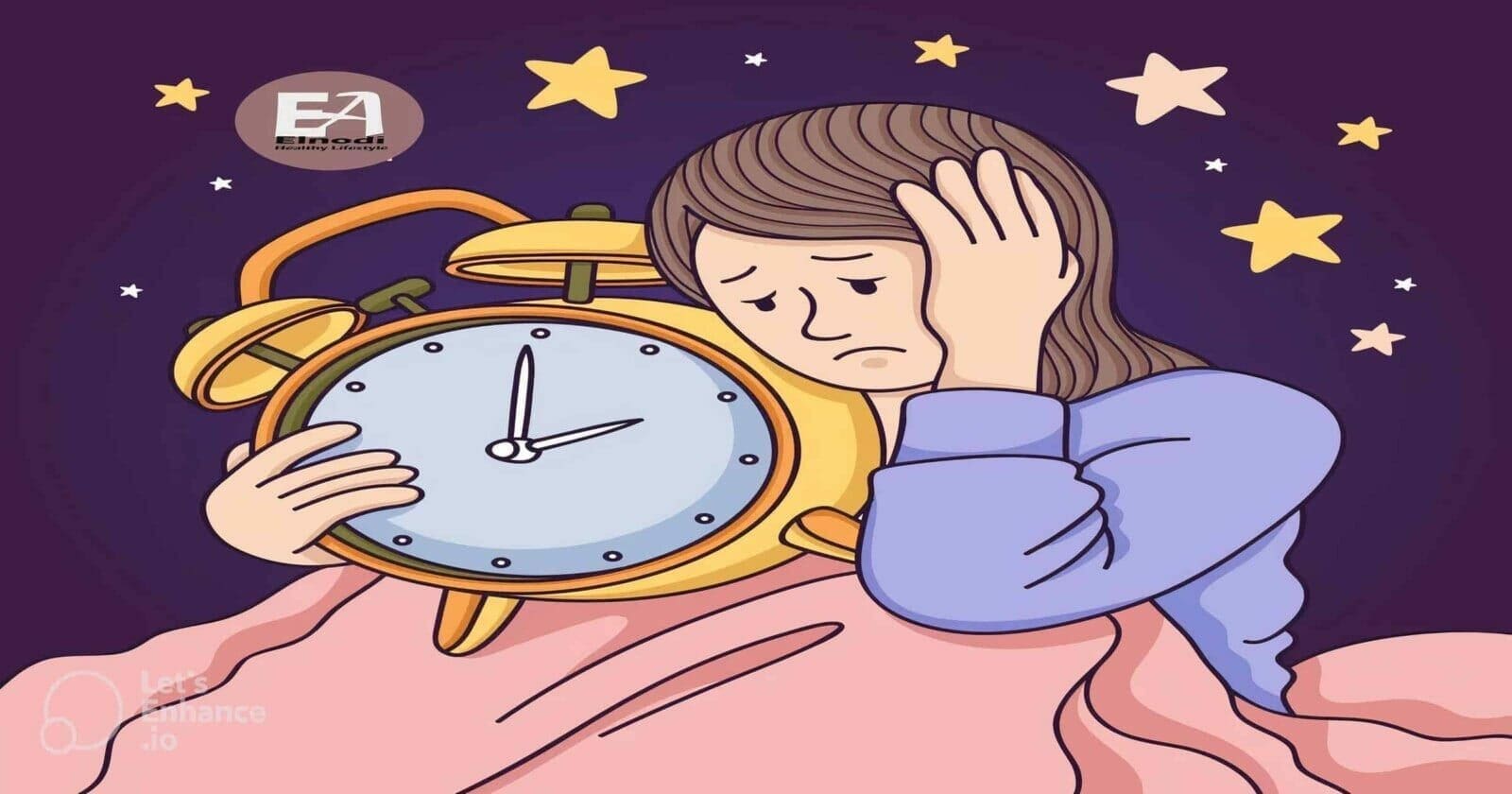Do you ever have trouble sleeping for hours? no matter how hard you try? There’s no need to worry; falling asleep is a skill that can be learned. Fortunately, there are some techniques that will help you get to the best sleeping hours fast and efficiently. (3)
Most of us spend around 25 percent of our time sleeping. That means that if you want to make the most of sleeping hours, it’s important to make sure that you’re doing everything possible to fall asleep.
There are many things that can be disturbing your sleep hours, and if you don’t take steps to fix them, they can quickly add up and lead to poor performance the next day.
Best sleeping hours
Want to fall asleep faster? Discover the best sleeping hours and ways to fall asleep fast, and easily with these tips! (1, 2)
You’re not destined to wake up exhausted every morning. Take into account easy suggestions for more restful hours, such as creating a sleep plan and adding exercise to your daily routine.
Understanding the Sleep Cycles
The intricate process of time spent sleeping is essential for physical and mental health. During sleep, the body repairs itself, consolidates memories, and regulates hormones. Sleep cycles are the natural progression of sleep stages that occur throughout the night. (4)
There are two main types of sleep: non-rapid eye movement (NREM) and rapid eye movement (REM) sleep.
- NREM sleep is further divided into three stages: N1, N2, and N3. N1 is the lightest stage of sleep, while N3 is the deepest stage of sleep.
- REM sleep is the stage of sleep when dreams occur. During REM sleep, the eyes move rapidly, the heart rate and breathing increase, and the muscles become paralyzed.
A typical sleep cycle lasts about 90 minutes and consists of four stages: N1, N2, N3, and REM. The first REM period is usually short, lasting only a few minutes. As the night goes on, the REM periods become longer, and the deepest stages of sleep (N3) become shorter.
Adults typically need 7-8 hours of sleep per night. However, the amount of time that people need varies from person to person. Some adults may need more time, while others may need less. (8, 9)
There are many factors that can affect sleep, including:
Age: Infants and young children need more hours than adults.
Health: adults with certain medical conditions, such as sleep apnea or restless legs syndrome, may have trouble hours of sleep.
Stress: Stress can make it difficult to fall asleep and stay asleep.
Environment: A comfortable sleep environment is important for getting a good night’s sleep. This includes having a dark, quiet, and cool bedroom.
Habits: Good sleep habits, such as going to bed and hours of waking up at the same time each day, can help improve hours of sleep habits.
How much sleeping should we get?
The amount of sleep a person needs varies depending on their age, lifestyle, and individual needs. this is the Schedule of hours of sleep by age:
| Age | Time spent sleeping |
| 0–3 months | 14–17 hours total |
| 4–12 months | 12–16 hours total |
| 1–2 years | 11–14 hours total |
| 3–5 years | 10–13 hours total |
| 9–12 years | 9–12 hours total |
| 13–18 years | 8–10 hours total |
| 18–60 years | at least 7 hours per night |
| 61–64 years | 7–9 hours each night |
| 65 years and older | 7–8 hours each night |
Tips for best sleeping hours schedule Fast

If you are having trouble with hours of sleep, there are a number of things you can do to improve your hours of sleep. These include:
Be patient while you adjust your bedtime. If you want to get to bed earlier, consider gradually reducing your bedtime until you reach the desired hour. You might frequently need a doctor’s assistance with this.
According to Rafael Pelayo, MD, clinical professor at the Stanford Sleep Disorders Clinic at the Stanford University School of Medicine in California, “Generally speaking, it’s easier to push away sleep than to advance sleep.” “So you could stay up later by an hour at a time, but it’s hard to go to bed earlier.” Dr. Pelayo advises gradually adjusting your bedtime by no more than 15 minutes every two or three days in order to fall asleep sooner.
Even if you feel fatigued, avoid taking a nap. The act of napping can keep you from falling asleep at night. Planning workouts and a schedule of the hours you feel like napping is something Pelayo suggests. “The activity will make you feel less sleepy. You can reserve that desire to sleep for a later time, he advises.
Avoid snoozing in and wake up at the same time every day. Being regular is crucial to keeping a healthy sleep routine. Don’t hit the snooze button and get a good alarm clock. Pelayo says, “The clock in your head requires instructions.
The brain anticipates that adults will need hours of waking up at roughly the same time each day, and whether they do or does not give the brain the instructions it needs. Weekends and time zone switching are strange concepts to the way the brain functions.
Avoid being in the light right before bed. According to research, being exposed to dusk light can cause your body clock to change to a later schedule. proper up arrow Keep in mind that light alerts the brain that it is hours to wake up. Avoid bright indoor and outdoor light close to bedtime (this includes light from cell phones, laptops, and TV screens), and keep your surroundings dark at night if you’re attempting to get to sleep early.
Avoid exercising too close to bedtime. A workout too soon before night might help keep the brain and body on (by increasing heart rate and body temperature) and make it harder to sleep, even if keeping active during the day normally supports sound sleep.
Proper up arrow As long as you don’t exercise an hour before bed, some studies suggest that evening workouts can help sleep, but it also relies on the individual and how their bodies react to exercise. proper up arrow If you plan to work out later in the day, think about choosing low- or moderate-intensity routines that will be less stimulating. Also, make sure you finish your activity with a cool down.
Watch what you consume right before bed. Try to stay away from foods that are high in caffeine, nicotine, and sugar, all of which can produce a surge in blood sugar. Acid reflux or heartburn may also be brought on by spicy, acidic foods. proper up arrow Pick up a light snack like sour cherries or kiwis if you’re feeling peckish; all of these fruits have been proven to encourage sleep.
Take advantage of the sun’s energy. when you wake up, exposure to sunlight (or other strong light) helps set your circadian rhythm for the entire day so that your body truly feels drowsy when it’s hours to go to bed.
Proper up arrow Natural sunshine is preferred, but if you can’t get outside or there isn’t any, there are specialized indoor lights that can be used.
Schedule a visit with your healthcare provider. Inform your doctor if your sleep schedule is causing problems for your job or other obligations if the aforementioned solutions don’t work, or if you’re having any problems with hours of sleep in any manner.
proper up arrow Our ability to perform and maintain good health both now and in the future is impacted by sleep. It can be quite harmful to consistently lack quality sleep, but there are healthcare professionals that can assist. Your healthcare physician can recommend you to a sleep specialist if they are knowledgeable about sleep but you don’t think they are.
Natural Remedies for best sleeping hours
There are a number of natural remedies that can help increase the habits of sleep. These include:
Melatonin: Melatonin is a hormone that helps regulate sleep and wake cycles. It is produced by the pineal gland in the brain and is released in response to darkness. Melatonin supplements can be taken to help improve the schedule for getting enough sleep.
Valerian root: Valerian root is a plant that has been used for centuries to treat insomnia. It is thought to work by relaxing the nervous system and promoting a schedule of sleeping hours per night.
Magnesium: A mineral called magnesium is necessary for several body processes, including sleep. Magnesium supplements might help you get a better night’s sleep by easing tension in your body and encouraging relaxation.
Chamomile tea: Chamomile tea is a herbal tea that has been shown to have calming and relaxing effects. It can be enjoyed before bed to aid in going to sleep.
Lavender essential oil: Lavender essential oil is a natural sedative that can help promote sleep. It can be diffused in the bedroom or applied to the skin before night.
Yoga: Yoga is a mind-body practice that can help improve bedtime hours schedule quality. Yoga poses can help relax the body and mind, and yoga breathing techniques can help promote relaxation.
Meditation: Meditation is a mind-body practice that can improve the level of your best sleeping hours. Meditation techniques can help calm the mind and promote relaxation, which can make it easier to fall asleep.
Avoid caffeine and alcohol before bed: Caffeine and alcohol can interfere with sleep. Caffeine is a stimulant that can make it difficult to fall asleep, and alcohol can disrupt sleep later in the night.
Make sure your bedroom is dark, quiet, and cool: A comfortable sleep environment is important for getting a good schedule of hours sleeping at night. Make sure your bedroom is dark, quiet, and cool.
Get regular exercise: Exercise can improve the quality of the time per night you get at night. However, avoid exercising too close to schedule an hour of sleep per night, as this can make it difficult to fall asleep.
It is important to note that natural remedies may not work for everyone. If you are having hours of sleepiness, it is important to talk to your doctor. (5)
Medical Treatments for Insomnia
There are a number of medical treatments available for insomnia. These include:
Sleep medications: Sleep medications, also known as hypnotics, can help people fall asleep and stay asleep. There are two main types of sleep medications: benzodiazepines and non-benzodiazepines. Benzodiazepines are older medications that can be addictive. Non-benzodiazepines are newer medications that are less likely to be addictive.
Cognitive behavioral therapy for insomnia (CBT-I): CBT-I is a type of therapy that can help people change their thinking and behavior patterns about sleep. CBT-I can help people develop healthy sleep habits and learn how to manage stress and anxiety.
Relaxation techniques: Relaxation techniques, such as yoga, meditation, and deep breathing, can help people relax and fall asleep.
Light therapy: Light therapy is a type of therapy that uses bright light to help regulate the body’s natural sleep-wake cycle. Light therapy can be helpful for people with circadian rhythm disorders, such as delayed sleep phase syndrome.
Melatonin supplements: Melatonin is a hormone that helps regulate sleep-wake cycles. Melatonin supplements can help people fall asleep, especially if they have Sleep difficulties due to jet lag or shift work. (7)
Side effects of little sleep
Getting enough sleep is essential for your physical and mental health. When you don’t get enough hours per night, it can have a number of negative consequences, including:
Impaired cognitive function: It’s essential for memory consolidation and learning. When you don’t get enough hours per night, your ability to think clearly, learn new things, and make decisions can be impaired.
Increased risk of accidents: Its deprivation can lead to impaired judgment and coordination, which can increase your risk of accidents.
Mood swings: its deprivation can lead to irritability, anxiety, and depression.
Reduced immunity: It can weaken your immune system, making you more susceptible to illness.
Weight gain: It can lead to increased levels of the stress hormone cortisol, which can promote weight gain.
Heart disease: Lack of rest has been linked to an increased risk of heart disease.
Stroke: Lack of bed has been linked to a higher risk of stroke.
Diabetes: A higher risk of type 2 diabetes has been associated with poor sleeping habits.
Premature death: Studies have shown that people who sleep for less than 7 hours per night are more likely to die prematurely. (7)
Summary
In general, it’s ideal to get to bed sooner and wake earlier each day. Still, not everyone may benefit from the schedule of sleeping hours per night.
Making sure you receive enough sleep and that it’s quality sleep is even more crucial. By going to bed and the same hour every day to wake up, you may make sure that this occurs.
If you have problems falling asleep at night or have day hours sleepiness despite maintaining a regular hours schedule per night, consult a doctor. This can point to poor sleep quality per night problems that need additional research.
Frequently asked questions
what are the healthiest hours of sleep?
what is the 15-minute rule for sleep?
Here are some suggestions for what you can do during the 15-minute break:
.Read a book or magazine
.Listen to calming music
.Take a warm bath or shower
.Do some light stretching or yoga
.Write in a journal
.Meditate
.Get some fresh air
.Do something else that you find relaxing
what is the 10 3 2 1 0 sleep rule?
10 hours before bedtime: No more caffeine. Caffeine can stay in your system for up to 12 hours, so it’s best to avoid it in the afternoon and evening.
3 hours before bedtime: No more food or alcohol. Eating or drinking too close to bed can make it difficult to fall asleep.
2 hours before sleep: No more work. Working in bed can make it difficult to relax and fall asleep.
1 hour before sleep: No more screen hours. The blue light emitted from screens can interfere with sleep.
0 hours: No snoozing. Hitting the snooze button can disrupt your sleep cycle and make it harder to wake up feeling refreshed.
The 10-3-2-1-0 rule is a simple but effective way to improve your sleeping hours quality. If you’re having trouble sleeping hours, give it a try.
should I get 7 5 or 8 hours of sleep?
However, some adults may need more or fewer hours.
Here are some general guidelines for how many sleeping hours you need:
Newborns (0-3 months): 14-17 hours per day
Infants (4-12 months): 12-16 hours per day
Toddlers (1-3 years): 11-14 hours per day
Preschoolers (3-5 years): 10-13 hours per day
School-aged children (6-12 years): 9-12 hours per day
Teenagers (13-18 years): 8-10 hours per day
Adults (18-64 years): 7-8 hours per day
Older adults (65+ years): 7-8 hours per day
If you are not getting enough sleeping hours per night, you may experience the following symptoms:
Irritability
Mood swings
Difficulty concentrating
Increased risk of accidents
Weight gain
Reduced immunity
Increased risk of heart disease
Stroke
Diabetes
Premature death
References
- Chaput, J. P., Dutil, C., & Sampasa-Kanyinga, H. (2018). Sleeping hours: what is the ideal number and how does age impact this? Nature and Science of Sleep, 421-430.
- Perry, G. S., Patil, S. P., & Presley-Cantrell, L. R. (2013). Raising awareness of sleep as a healthy behavior. Preventing chronic disease, 10.
- Hartmann, E., Baekeland, F., Zwilling, G., & Hoy, P. (1971). Sleep need: how much sleep and what kind? American Journal of Psychiatry, 127(8), 1001-1008.
- Reinhardt, K. D. (2020). Wild primate sleep: Understanding sleep in an ecological context. Current Opinion in Physiology, 15, 238-244.
- Mars, B., & Fiedler, C. (2014). The Home Reference to Holistic Health and Healing: Easy-to-Use Natural Remedies, Herbs, Flower Essences, Essential Oils, Supplements, and Therapeutic Practices for Health, Happiness, and Well-Being. Fair Winds Press (MA).
- Attele, A. S., Xie, J. T., & Yuan, C. S. (2000). Treatment of insomnia: an alternative approach. Alternative Medicine Review, 5(4), 249-259.
- Loew, D. M., & Spiegel, R. (1976). Polygraphic sleep studies in rats and humans: their use in psychopharmacological research. Arzneimittel-forschung, 26(6), 1032-1035.
- Wingard, D. L., & Berkman, L. F. (1983). Mortality risk associated with sleeping patterns among adults. Sleep, 6(2), 102-107.
- Steptoe, A., Peacey, V., & Wardle, J. (2006). Sleep duration and health in young adults. Archives of internal medicine, 166(16), 1689-1692.
Latest posts
Exercise Lower Cholesterol: 7 Best Practices for Quick Results
Healthy High-Carb Foods: 8 Best Options for Energy Boost
Discover the best healthy high-carb foods that are both tasty and nutritious. Explore our top…
Foods to Avoid Migraines: 7 Proven Dietary Changes Needed
Foods to avoid migraines may be severe, interfering with everyday activities and productivity. While several…
Screen Headaches: 5 Steps to Prevent Digital Strain
Screen headaches have become increasingly common in the digital age, as we spend more time…
Block DHT: 6 Lifestyle Changes to Prevent Hair Thinning
Find out about 6 lifestyle modifications that effectively block DHT and stop hair loss. Find…
Hashimoto’s: Review, Foods, Vitamins, and Recommendations
Discover the optimal diet for managing Hashimoto’s disease. This comprehensive guide reviews essential foods, vitamins,…
Vicks Vaporub for health: Uses and Effectiveness Explained
Vicks VapoRub may help relieve cough and soothe sore muscles. Some anecdotal uses include relieving headaches,…
Vitamin E Fruits: Best 10 Sources for Health
Are you looking to boost vitamin E intake for better health and well-being? One of…
Chamomile Tea: 8 Amazing Health Benefits You Need
Chamomile tea is a popular herbal remedy known for its calming and soothing properties. But…
Daily Harvest: 8 Reasons to Try It Today
Are you looking for a convenient and nutritious way to fuel your body with delicious…
Sarsaparilla Tea Benefits: 10 Amazing Health Advantages
Discover the incredible sarsaparilla tea benefits with this comprehensive guide. From improving skin health to…
Sea Moss Benefits: Discover 7 Powerful Health Advantages
Have you heard about the amazing benefits of sea moss? This nutrient-rich seaweed has been…
Shrimp Tempura Secrets: 10 Tips for Success
Have you ever tried making shrimp tempura at home, only to have it turn out…
Keto Bread Crumbs: 7 Easy Homemade Variations
Are you following a keto diet and missing the satisfying keto bread crumbs in your…
Potato Starch: 3 Amazing Health Benefits Unveiled
Did you know that potato starch is not only a versatile ingredient in cooking, but…





